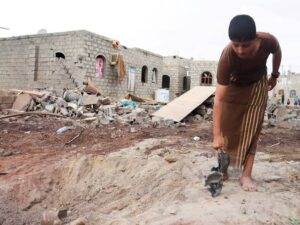Ali Mohammed, like tens of thousands of other Yemeni parents, has lost kids who were involved in the protracted conflict there.
But, in his instance, one son, Fahd, died in 2018 while fighting for the Yemeni government supported by Saudi Arabia, while the other, Nashwan, died the next year while fighting for their adversaries, the Houthi rebels supported by Iran.
After years of conflict, Saudi Arabia and Iran have now decided to reestablish diplomatic ties, shocking and confusing Yemenis like Mohamed.
“Now, they are ready to be buddies and provide concessions to fulfill their interests, while our country is immersed in ordeals,” said Mohammed, a resident of Sanaa, the country’s capital since Houthi authority was established in 2014.
Following multiple rounds of negotiations, including in Iraq and Oman, Saudi Arabia and Iran proclaimed their reconciliation last week in Beijing under Chinese mediation.
With the two regional powerhouses promising to respect state sovereignty and refrain from meddling in one another’s internal affairs, it will result in the reopening of their respective embassies within two months and the activation of a security cooperation mechanism.
While Riyadh and Tehran may have taken steps to put some of their disputes to rest, it is uncertain whether Yemen, which has been devastated by conflict, will see a similar outcome.
Since 2015, Saudi Arabia has been in charge of the military operation in Yemen that supports the internationally recognized government’s struggle against the Houthis. While Saudi Arabia and others have claimed that Iran has sent the rebels weaponry, Iran has stated that it does not. Many oil installations and airports in Saudi Arabia and its coalition partner, the United Arab Emirates, have been threatened by the Houthis in recent years.
The Houthis and the Yemeni government declared on Monday that a prisoner swap had been reached, as well as the release of 15 detained Saudis. The timing of the release was not immediately evident as to whether it was coincidental or not, and concerns remained regarding any more confidence-boosting measures following the Beijing agreement.
Yemeni political analyst and novelist Adel Dashela expressed his doubt that Yemen will become a stable nation over night as a result of the normalization of relations between Saudi Arabia and Iran.
According to Dashela, the Saudi-Iran accord won’t have a significant impact on the Yemeni issue. It is difficult to put an end to the Houthi takeover of Sanaa, get back the government weaponry they took, and make them give up using firearms.
Speaking on the potential drivers for an accord, he cited the security requirements of Saudi Arabia, Iran’s “internal difficulties,” and the effects of American sanctions.
“For this reason, all parties agreed to make sacrifices and restore communication.”
According to the United Nations, the conflict in Yemen has resulted in hundreds of thousands of deaths, millions of displaced people, and the worst humanitarian crisis ever. Three-quarters of Yemen’s population, or more than 23.4 million people, need aid, including 2.2 million children who are severely undernourished.
The Saudi-Iran pact, according to Abdulrahman, a 53-year-old retired military officer in Sanaa, served as a reminder to Yemenis that their nation’s problems stem from the absence of a strong central government.

According to Abdulrahman, who did not want to use his full name, “had the country have experienced and intelligent political leaders, we would not dive into this instability in the first place and let foreign powers rule our fate.”
He claimed that the high death toll from years of battle had increased hostility between the warring parties.
“The Yemeni proxies have been ready to follow the directives of their regional supporters in order to achieve military and political success. That is why human misery has been so prevalent in our nation.
The detente between Riyadh and Teheran was hailed by the Houthis and the Yemeni government, who both expressed a desire for peace.
Mohammed Abdulsalam, the senior negotiator for the Houthis, stated that the region needed a return to regular relations amongst its nations.
The government also stated that it always believes that conflicts may be resolved through conversation and diplomatic means. The government expressed hope in its statement that the Saudi-Iran agreement will usher in a new era of regional relations.
Those words were not shocking to Abdulrahman.
“They [the Houthis and the government] are submissive forces and do not resist the Saudi and Iranian efforts and goals.”
A nation forming alliances within its territory and with other nations was considered normal, but he emphasized that “these relations should not render our country slave to any other power.”
The elites of Yemen “failed to achieve that,” according to Abdulrahman.
Meanwhile, Mohammed expressed his belief that Yemen had been betrayed.
The heartbroken father declared, “They have burned Yemen for seven years to further their competing agendas. They start a new chapter of collaboration and partnership today. So, for what reason did they fight in Yemen?




